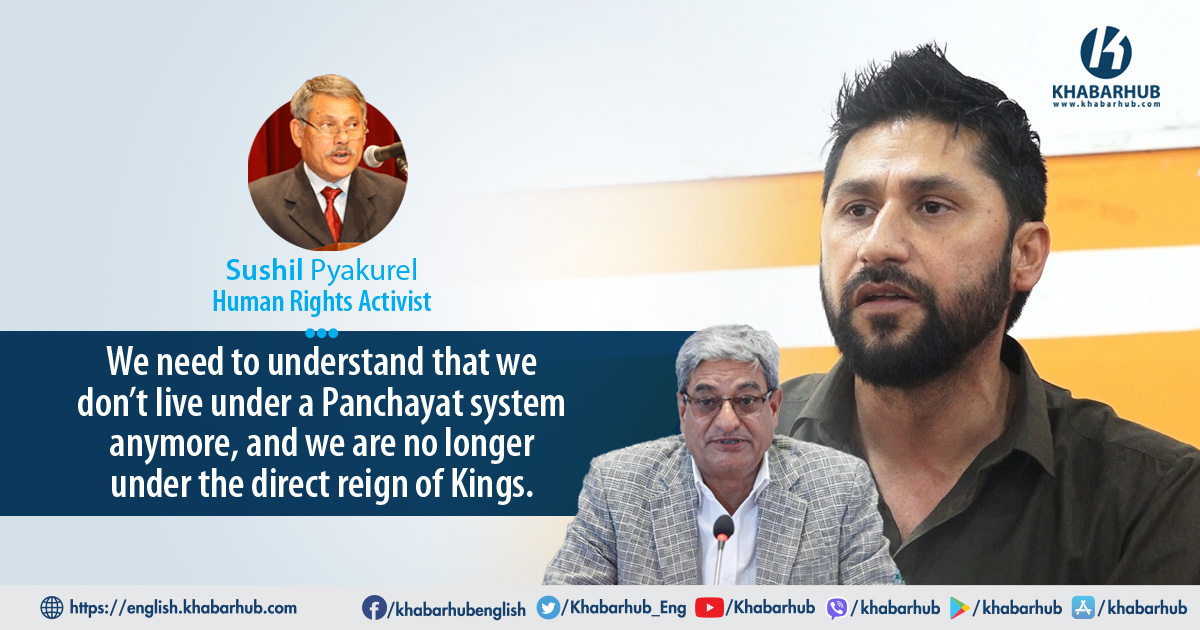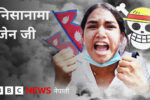KATHMANDU: The work to conclude Transitional Justice (TJ) for human rights violations during the 10-year armed conflict is still pending.
Additionally, state agencies continue to face accusations of involvement in human rights abuses.
How responsibly are state agencies, political parties, and human rights activists working to ensure human rights? Below is an edited excerpt from a conversation between Khabarhub and human rights activist Sushil Pyakurel.
What challenges do you see in ensuring human rights in Nepal, especially in the current context?
There are growing concerns about the role of the government and its agencies.
Specifically, it has been reported that police officers abused former Home Minister Rabi Lamichhane, who was arrested on charges of cooperative fraud, while transferring him from Chitwan to Pokhara.
No one should ever be punished or treated unlawfully—this is a fundamental principle.
In many cases, we have already established global standards to safeguard human rights.
The situation surrounding Rabi Lamichhane is particularly serious. Some have dismissed it by saying, “no action should be taken, it’s nothing,” but I strongly object to this.
If there is evidence from the investigation, we should all accept the truth, no matter who it involves.
Recently, we saw that even the President of South Africa was investigated, and his foreign travel was halted. This sends a clear message: no one is above the law.
What concerns you about the way the police handled Rabi Lamichhane’s situation?
The way the police handled Rabi Lamichhane—whether or not he was guilty—raises concerns.
We should not be indifferent to such actions. We must oppose this behavior, especially when it involves human rights violations.
It’s reported that Lamichhane in police custody was taken to Pokhara from Chitwan in the middle of the night, which is also deeply troubling.
We have our own laws, practices, and cultural values, and such actions cannot be justified. It seemed like an attempt to create fear, to intimidate citizens.
In a democratic republic, this is not just an abuse of power—it’s a crime. When activists protest against such actions, it highlights the disregard for the rule of law.
Could this be the result of political pressure or influence over the police and other government agencies, as we’ve seen in the past?
Absolutely. The current Home Minister has not publicly defended the police’s actions of taking citizens at night.
He should speak out on this issue, because police should never abuse their power.
At times, when the government machinery is weak, chaos ensues. This is when these kinds of violations occur.
There should be an immediate investigation into why this happened, and the Home Minister must be held accountable.
If the police overstep their boundaries, it’s the government’s responsibility to investigate and respond.
Do you think political pressure could be influencing these events?
We need to understand that we don’t live under a Panchayat system anymore, and we are no longer under the reign of King Gyanendra.
We live in a democratic republic where even the president can be investigated. Therefore, the Home Minister should be held accountable.
It’s crucial that we uphold the dignity of the law. Our responsibility is to remain disciplined and demand answers from the authorities, regardless of political affiliations.
Do you think the failure to distinguish between civil, human, and political rights plays a role in this situation?
Yes, absolutely. The police in Nepal have become so politicized that it appears they are more concerned with pleasing the Home Minister than enforcing the law impartially.
This is a huge problem. Human rights bodies, especially the Human Rights Commission, must become more active and hold those guilty of such violations accountable.
How do you see the role of global human rights standards in Nepal’s context?
The concept of human rights has evolved globally, with documents like the Magna Carta in 1215 considered a cornerstone.
Nepal has made progress in adopting global human rights standards, but contradictions remain.
Some who claim to be fierce defenders of human rights are the same parties committing atrocities elsewhere.
The global powers, like the U.S., remain silent on these issues, even fueling violence. But that doesn’t mean we should be silent.
We are a free country, and we must speak up. If our state machinery fails to take action, it will be the political leadership that bears the consequences. We cannot afford to turn a blind eye when it comes to human rights.
What is the biggest challenge in human rights today in Nepal?
Right now, the biggest challenge in Nepal is finalizing transitional justice. There are thousands of conflict victims who have yet to feel justice.
The status of the disappeared is still unknown, and no one knows where they are.
What could be a greater injustice than that? For 18 years, we’ve been in a situation where we cannot even say what happened.
This delay in addressing the victims’ needs is a major violation of their rights.
Do you agree that the transitional justice process has been flawed?
Absolutely. The process of creating a transitional justice mechanism has been full of missteps.
Some people involved in this process have little understanding of human rights or transitional justice.
The person in charge should be someone with direct experience in this field—someone who understands the pain and needs of conflict victims.
Competence is key. When creating these mechanisms, the victims’ voices and experiences must be taken into account. Only then can we hope to achieve real justice.
Do media and advocacy organizations contribute to the challenges in the human rights situation?
Yes, there is definitely a problem with how the media and advocacy organizations address human rights issues in Nepal.
The media should communicate accurate, fact-based information to the public. It’s not just about reporting the news; it’s about raising awareness and educating the public on critical issues.
For example, when the police took Rabi Lamichhane in the middle of the night, the media should have spoken out against that action.
They should have raised their voices and made it clear that such treatment of a citizen is unacceptable.
Awareness needs to be built not just through reporting but also through active advocacy for human rights.
Both the media and advocacy organizations can play a more powerful role.









Comment